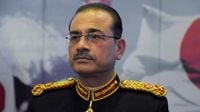On April 17, 2025, Pakistan Army Chief General Asim Munir reignited the long-standing Kashmir issue, asserting that no external force could sever the ties between Kashmir and Pakistan. Speaking at a recent event, Munir emphasized the distinct identities of India and Pakistan, reiterating that they are fundamentally different nations. His remarks come just days after India criticized Pakistan for raising the Kashmir matter during a United Nations debate focused on peacekeeping reforms.
During his address, General Munir invoked the two-nation theory, which posits that Muslims and Hindus constitute two separate nations based on their distinct religious, cultural, and ideological identities. "Our forefathers thought we are different from Hindus in every possible aspect of life. Our religions are different, our customs are different, our traditions are different, our thoughts are different, our ambitions are different. That was the foundation of the two-nation theory that was laid there. We are two nations, we are not one nation," he stated.
Munir's comments are a call to remember and promote the narrative of Pakistan's origins, urging citizens to pass down the story of the nation to future generations. "You have to narrate Pakistan’s story to your children so that they don’t forget it when our forefathers thought we were different from Hindus in every possible aspect of life," he said. His insistence on the importance of this narrative reflects a broader strategy to reinforce national identity among Pakistanis.
In addition to discussing Kashmir, General Munir also addressed the issue of terrorism in the Balochistan region. He vowed to intensify efforts to combat terrorism, declaring it the "destiny of Pakistan." He stated, "Even ten generations of terrorists cannot harm Balochistan and Pakistan," showcasing his confidence in the military's capability to tackle threats posed by groups such as the Balochistan Liberation Army (BLA), Balochistan Liberation Front (BLF), and Baloch Republican Army (BRA).
"You think these 1,500 terrorists, belonging to BLA, BLF and BRA, etc., can take away Balochistan from us?" he challenged, underscoring the military's resolve to maintain control over the region. Munir's rhetoric aims to bolster morale among the armed forces and the public, reinforcing the idea that unity and strength can overcome any challenge.
Moreover, General Munir did not shy away from addressing international issues, expressing solidarity with the Palestinian people who have been affected by recent military actions in Gaza. He remarked, "The hearts of Pakistanis beat in unison with the Muslims of Gaza," highlighting Pakistan's longstanding support for Palestine.
These statements from the army chief come amid a backdrop of heightened tensions between India and Pakistan, particularly regarding Kashmir, which has been a contentious issue since the partition of British India in 1947. The Kashmir conflict has led to several wars and ongoing military skirmishes between the two nations, each claiming the territory in full but controlling only parts of it.
General Munir's remarks have sparked a mixed response both domestically and internationally. Critics argue that his emphasis on the two-nation theory and the differentiation between Muslims and Hindus perpetuates division and hostility, while supporters believe it is essential for preserving Pakistan's identity and sovereignty.
In the context of Pakistan's internal security challenges, Munir's focus on Balochistan is particularly relevant. The province has been plagued by violence attributed to various separatist groups, which have sought greater autonomy or independence from Pakistan. The military's operations in the region have often been met with resistance, and the situation remains complex.
As tensions continue to simmer in both Kashmir and Balochistan, General Munir's statements reflect a broader narrative aimed at consolidating national identity and unity in the face of external and internal challenges. His call to remember the sacrifices of past generations serves as both a rallying cry and a reminder of the ongoing struggles faced by the nation.
In conclusion, General Asim Munir's recent comments underscore the complex interplay of national identity, historical narratives, and contemporary security issues in Pakistan. As the country navigates these challenges, the emphasis on unity and resilience remains a central theme in its discourse.



